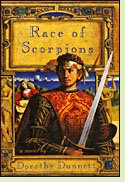Race of Scorpions
by Dorothy Dunnett
Reviewed by David Maclaine

In Race of Scorpions, the third novel in Dorothy Dunnett's eight-volume Niccolo saga, her brilliant hero Nicolas vander Poele finds himself reeling from a recent bereavement and determined to avoid being drawn into the schemes of others. But by now the genius of the rising young merchant has become too widely known to allow him all the time he would wish to decide upon goals of his own. Instead he becomes a prize in the conflict between two rivals for the throne of Cyprus, cast once more into an environment rife with intrigue and betrayal, where the rich rewards dangled before him cannot be secured without dire peril. Once more the reader must guess along with Nicolas' friends and adversaries exactly where his loyalties lie and how his schemes to survive a scorpion's nest of conspiracy will play out. The players in the game include a bisexual prince whose interest in Nicolas may not be wholly platonic and a beautiful courtesan whose attentions clearly are not. As ever, the fiercest enemy may be a member of his own family, and once again he must suffer violent assault and deep personal loss.
Dunnett's plots unfold like a grandmaster's running commentary on a chess match, with glimpses of a dazzling array of plans and possibilities that make it clear the author and her hero share powerful minds able to master clouds of complexity. If you can apply a human calculus as refined as a chess-champion's power to visualize future moves, you may be able to see through to where these complications will end - once or twice in Race of Scorpions I could actually detect when the brilliant Nicolas miscalculated - though most of us will never guess the dramatic culmination of the story, much less the twists that follow. But having passed through another of Dunnett's dazzling mazes, those of us addicted to them will hurry to the next novel of the set. (1989, 534 pages)
More about Race of Scorpions at Powell's Books or Amazon.comOther novels set in Cyprus:
The King's Witch by Cecelia Holland (2011), about a young Jewish woman with healing skills who travels to Cyprus with Richard the Lionheart and his sister. See review or more info at Powell's Books
The Red Sea by William Napier (2012), about two young Englishmen caught up in the Ottoman attack on Cyprus in 1571; #2 in the Clash of Empires series. More info
A Blind Man's War by David Fiddimore (2011), about a former RAF pilot fighting terrorists in Cyprus in the aftermath of World War II; #6 in the Charlie Bassett series. More info
Nonfiction about the history of Cyprus:
Cyprus: An Island Culture. Society and Social Relations from the Bronze Age to the Venetian Period edited by Artemis Georgiou (2012). More info
A Traveller's History of Cyprus by Tim Boatswain (2005). More info
Cyprus: From Earliest Time to the Present Day by Franz George Maier (1964 in the original German, English translation 1968). More info
Online:
Kingdom of Cyprus at Wikipedia
Back to Novels of the Renaissance
Back to Directory of Book Reviews